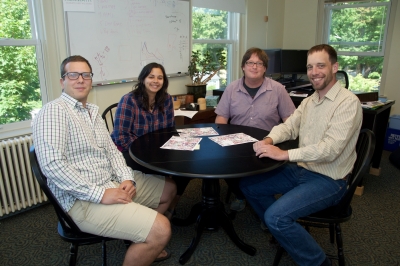You are here
How to roll your R’s like a scientist! / Aprendiendo la R científica
[The English version of this post is followed by a Spanish version, also written by Mayra.]
In a world where both natural and human driven disturbances have caused an array of changes in the landscape, we would expect that land-use and land-cover change could become either an asset or a threat to our environment. Here at the Harvard Forest the landscape simulation crew has joined forces to predict land-use change effects on the ecosystem and its services. These services are benefits obtained from ecosystems that provide people with necessities such as fresh water, food and fuel. Understanding how the landscape is changing can inform policymakers and future land-management decisions within the state of Massachusetts.
I've been working hand in hand with my mentors, Dr. Jonathan Thompson and Dr. Matthew Duveneck, and, my all-time favorite researchers and bickering duo, Mr. Luca Morreale and Ms. Meghan Blumstein, to identify hotspots (areas that provide a high value of ecosystem services). We identified these hotspots within four previously developed land-use scenarios that consider different trajectories for land-use change over the next 50 years in Massachusetts, reflecting different intensities of development, harvest and conservation.
While Luca absolutely can't pronounce the "rolling r" sound in Spanish, I've come to learn a new way of rolling R's. Now, considering I come from the always gorgeous (don't dare to disagree!) island of Puerto Rico, I would have thought I had that mastered way long ago. However, R's now come in a language very different from Spanish (and English!): that is the programming language R, a very useful statistical and graphics visualization software that has come in quite handy in our analysis.
So, to make it simple or, as we say back home, en arroz con habichuelas, I've done my best to learn the art of coding throughout these past ten weeks. I've been applying my newfound knowledge on incredibly large datasets in search of areas in the state of Massachusetts that could provide a high number of ecosystem services under different landscape "treatments". We then analyzed the distribution and abundance of these hotspots to determine land-use scenario viability and, consequently, provide useful information for future land-management decisions.
To say the least, I'm awfully excited to continue this incredible (indoor) adventure and share our findings with the community, all while enjoying what's left of the 2015 Harvard Forest Summer Program surrounded by the beautiful landscapes of New England. More so, I'm extremely thankful for joining the landscape simulation crew this summer, meeting so many remarkable people and learning so much from this incredibly rewarding experience.
Part of the landscape simulation crew (from left to right: Luca Morreale, Mayra Rodriguez-Gonzalez, Jonathan Thompson and Matthew Duveneck)
Parte del equipo de trabajo (de izquierda a derecha: Luca Morreale, Mayra Rodríguez, Jonathan Thompson y Matthew Duveneck)
Photo by Jenny Hobson
Aprendiendo la R científica
Por Mayra I. Rodríguez González
En un mundo donde los disturbios naturales y las actividades humanas han causado una serie de cambios en la Tierra, habría de esperarse que el cambio en uso y cobertura de terrenos pudiese tanto ayudar como amenazar nuestro medio ambiente. En Harvard Forest, el equipo de simulación de terrenos ha unido fuerzas para predecir los efectos del cambio en uso de terrenos sobre el ecosistema y sus servicios. Estos servicios son beneficios que provienen del medio ambiente y nos proveen con necesidades tales como agua fresca, alimento y combustible. Entender como los terrenos cambian a través del tiempo puede ayudar en la toma de decisiones y el desarrollo de políticas de conservación en el estado de Massachusetts.
He estado trabajando mano a mano con mis mentores, el Dr. Jonathan Thompson y el Dr. Matthew Duveneck, y, el excelente par de investigadores, el Sr. Luca Morreale y la Srta. Meghan Blumstein, identificando “zonas calientes” (áreas que proveen un alto valor de servicios del ecosistema). Identificamos estas “zonas calientes” dentro de cuatro escenarios de uso de terrenos previamente desarrollados que consideran trayectorias diferentes respecto al cambio en uso de terrenos a partir de los próximos 50 años en el estado de Massachusetts, reflejando distintas intensidades de desarrollo, cultivo y conservación.
A pesar de que Luca es incapaz de pronunciar la “r” en español, he tenido la oportunidad de aprender una nueva manera de rodar las “r’s” gracias a éste. La letra R ahora se da en un lenguaje muy diferente al español (¡e inclusive al inglés!), éste es el lenguaje de programación R, un software de estadísticas y visualización gráfica que se ha convertido en una herramienta muy útil para nuestro análisis.
Para simplificar o, como decimos en casa, “en arroz con habichuelas”, he dado mi mayor esfuerzo para aprender el arte de la codificación a través de estas pasadas diez semanas. He estado aplicando esta nueva destreza en una serie de datos extensos en búsqueda de áreas en Massachusetts que puedan proveer un alto valor de servicios del ecosistema bajo los cuatro “tratamientos” o escenarios de uso de terrenos. Luego, analizamos la distribución y abundancia de estas “zonas calientes” para determinar la viabilidad de cada escenario y, a partir de esto, proveer información útil para la toma de decisiones en cuanto al uso y la distribución de terrenos del área de interés.
Es por esto que estoy sumamente contenta de poder continuar esta aventura (frente a un monitor) y compartir nuestros descubrimientos con la comunidad científica y el público general mientras disfruto lo que resta del programa de verano de Harvard Forest 2015, rodeada por los hermosos paisajes de New England. Más aún, estoy extremadamente agradecida de haber formado parte de este equipo de trabajo, conectando con tantas personas y aprendiendo muchísimo de esta experiencia.


